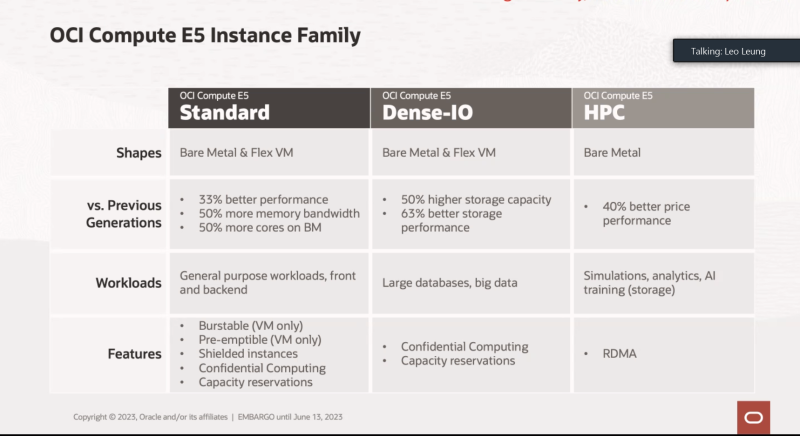Oracle is once again offering customers the choice of systems for running its OCI Compute E5 Instance Family. Customers can choose from Kubernetes, bare metal, or its own Flexible (Flex VM) system for running most of the workloads, aside from specific high-performance assignments, that can only run on bare metal.
Leo Leung, VP of products and strategy at Oracle highlighted Oracle’s Flexible as an alternative to Kubernetes that could save customers money with OCI over other hyperscalers like AWS or Azure. Kubernetes, he noted, forces customers to provision more cores than they need for the workload.
“With every other cloud provider the only way you buy virtual machines is by these T-Shirt sizes — meaning you have to buy 1, 2, 4, 8, 16 or 32 cores, but if your workload doesn’t require 16 cores but 9 cores, you still buy 16 cores... Or re-write your application,” Leung said on a call with Silverlinings.
“It’s an interesting dilemma I think the customer has been facing for a long time,” Leung opined, and said that Flexible compute allowed the customer to save money with OCI over other hyperscalers.
Basically, if the workload only requires nine cores then the customer doesn't need to provision 16 to run the workload when using Flex VM, he said.
Of course, Oracle still offers Kubernetes, as well as bare metal and Flexible.
The company is delivering three new compute offerings, tailored for different kinds of cloud workloads, that use AMD’s 4th generation EPYC Genoa processors, in its new E5 Instance Family.
“We have number of different compute-as-a-service offerings, these are Instances that customers can rent from Oracle,” Leung said.
These can be offered on an on-demand or contract basis. The company is providing Standard, Dense-IO, and HPC Instances.
“Standard generally hits the majority of workloads, these are things like application servers and web servers,” Leung said. Dense-IO incorporates local storage on the server. The HPC Instances use higher clock speed processors for specific workloads.
“Nissan is using HPC Instances for digital car design, and things like crash testing and aerodynamic testing,” he said.
“Pretty recently, we signed Uber as a customer," he added, saying that Uber is moving to Oracle on bare metal, which offers the lowest latency. Other new customers include Soundhound and Phenix.
See the chart below for more details on the E5 Instance Family.
